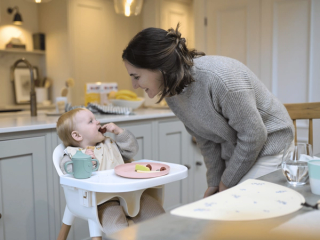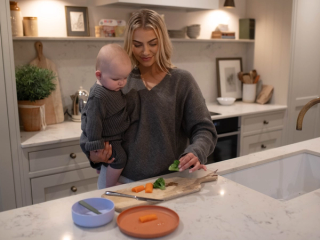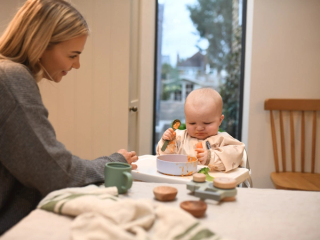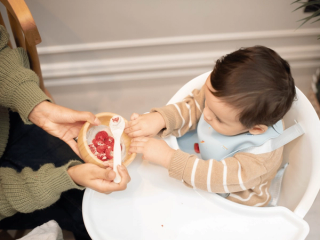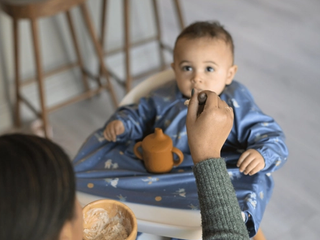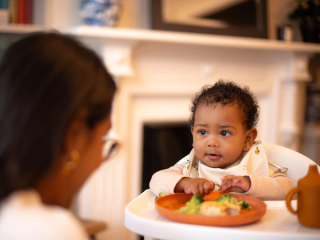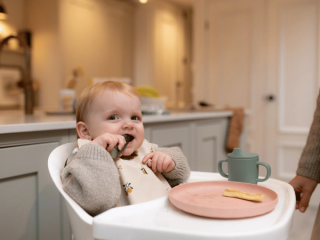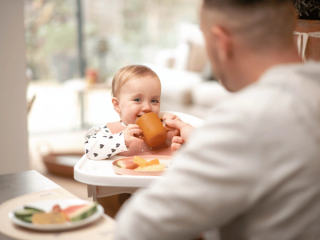
- Home
- Advice Hub
- Baby
- Weaning
- What To Do If Your Baby Refuses Food?
What to do if your baby refuses food?
Sometimes babies don’t take to weaning as quickly as parents expect and that can feel stressful. This article is going to talk through some of the best strategies for you to have up your sleeve in case you need them!
The first thing to say here is that it is very normal to have some food refusal from your baby. If it’s a one off, or happens irregularly you don’t need to be concerned. Just finish the meal and try again next time.
Sometimes babies don’t take to weaning as quickly as parents expect and that can feel stressful. This article is going to talk through some of the best strategies for you to have up your sleeve in case you need them! (Note: these are things we should be doing anyway, not just if your baby isn’t eating well).
Baby isn’t eating as much as you think they should?
Before we get into the best approaches to use, we want to make sure there really is a problem. Experience tells us that parents often worry babies ‘aren’t eating’ when the reality is they just aren’t eating as much as expected.
It’s not unusual for babies to eat less than parents expect them to. If this is the problem you’re currently having, then think about the following:
- Do they seem satisfied after meals? If so, it’s likely they’ve had enough to eat, and you don’t need to worry. You can check out our article on responsive feeding here to learn more about trusting your baby’s feeding cues.
- Are they growing well? The growth charts in your baby’s red book are there to show whether they are growing as they should be. If you’ve not had your baby weighed recently (within the last 2 – 3 months) see if you can get an appointment with your health visitor or GP to have the weight and length plotted on the growth chart to put your mind at rest.
- Appetites fluctuate from day to day, so if your baby eats well on some days that’s positive. It means they’re listening to their body. Try to think about hungry days and less hungry days, not good and bad days.
- All babies have different appetites, so if you see another baby eating more or less than yours it really doesn’t matter! You don’t know what that baby ate yesterday or how much they need in comparison to your little one.
If you’ve thought about those things and you’re still concerned that your baby isn’t eating well or that they don’t seem interested in food at all there are a few things you can do to help.
Sit and eat together
Eating is a big adjustment and a learning curve for most babies and they need to be shown what to do. Plus doing what you’re doing is usually going to be something of interest! If you aren’t already, sit and eat too, opposite your baby ideally so they can see you picking food up, taking bites and chewing. You can even do exaggerated movements to show what you are doing and to involve them. You might feel silly, but it’ll help your baby to be more aware.
If you have a table, it’s a good idea to get in the habit of using it. Even if the highchair doesn’t quite reach the table because of the tray, it is better to do that than having the high chair somewhere with nobody else eating.
Try to stay calm
This may be easier said than done if you are worried. But the more anxious you become and the more you draw attention to food refusal the more likely it is that your baby will notice. Applying pressure to eat or being anxious at mealtimes may negatively impact their eating – exactly the opposite of what you are trying to achieve . Ending a meal early is sometimes better than leaving your child for an extended time in front of a meal they don’t want to eat. If your baby’s appetite is inconsistent, try presenting them with a little bit at a time, so you can bring the leftovers out later when they seem hungrier.
Minimise distractions
If there’s too much going on at mealtimes it can take attention away from the food. Sometimes things we wouldn’t even consider affecting eating can be a distraction:
- Pets
- Television
- You! – are you off doing the washing up or clearing up the kitchen? Yes, that will distract your baby too. As parents ourselves we realise it can be hard to find the time to just sit without doing things, but once you know the importance of sitting with your baby for a few minutes, hopefully you can make time.
Ensure your baby is in a good seated position.
When babies are in a good position to eat, they tend to find it easier and are able to better concentrate on what they are doing. If they are having to spend any energy (even subconsciously) trying to sit properly or trying to reach food, this can take their focus away from feeding themselves.
- Tray/tabletop should be halfway between tummy button and chest.
- Feet should be well supported; so if your high chair doesn’t have a footrest try to add a universal footrest. This will ensure they are stable and able to stay upright with greater ease.
- Food should be within easy reach.
Don’t overwhelm
Having too much food in front of your little one can feel overwhelming. Sometimes, if there is too much to choose from, they’ll just avoiding taking anything at all. So, if you’re using a plate, just put a couple of things on it at a time and replenish it as needed.
Try to space out the milk and solid feeds
There’s no right or wrong when it comes to offering milk or solid food first and for most babies it really doesn’t matter. When you first start weaning, it’s a good idea to give solid food about halfway between milk feeds as your baby doesn’t yet know that solid food fills their tummy and so they just want milk when hunger strikes. You may be giving food too close to a milk feed and the appetite simply isn’t there for a meal.
Be consistent
Try to be consistent with mealtimes. Your baby will start to get used to a routine and over time will be hungry for food at times that meals are usually given. When timings are erratic it can be harder for the appetite to regulate.
Advice & tips

Want to read more? Join the HiPP BabyClub for full access to this article.
As a BabyClub member, you'll get access to a range of exclusive benefits, including:
Monthly competitions
Discounts from our Partners
Expert advice tailored to your little one's age
Weaning recipes
HiPP shop discounts*
*10% off HiPP's online shop does not apply to our First Infant, Anti-Reflux or Comfort Formula Milk.
Important notice: Breastfeeding is best. Follow on milk should only be used as part of a mixed diet from 6 months. Talk to a healthcare professional.




